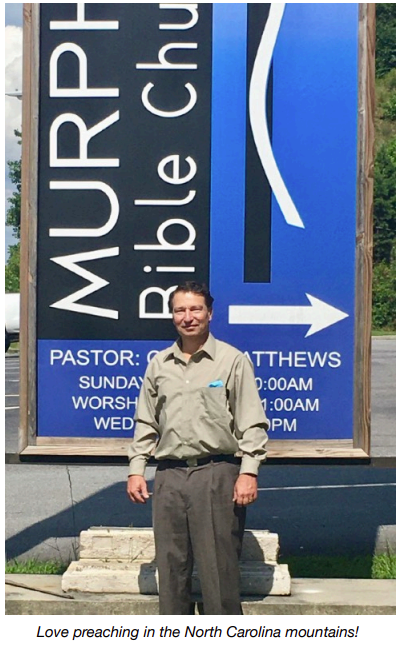Volume 30 Issue 3
A publication of Focus Evangelistic Ministries, Inc
Fall 2020
THE COMMUNICATOR
Focus Evangelistic Ministries, Inc. PO Box 498 Danielsville, GA 30633
Can We Judge Them?
Does the Bible encourage us to judge people to see if they are saved or not by looking at what they do? We have often heard people say, “By their fruit you will know them.” But couldn’t it get messy if we all start judging one another and calling each other out as fake believers? Wouldn’t this be especially dangerous considering the fact that all saved people actually do still sin? Wow, can’t you just imagine open season at the church fellowship! Isn’t there enough misunderstanding, gossip, and legalism among us already, without everyone taking on the title of “Judge of Who is Saved or Not?”
“If we allow the context to be removed, the Bible can say almost anything.”

Based on the popular belief that we can judge who is saved or not by sins committed, David would be in Hell, wouldn’t he? For a person in the right place, at the right time, Abraham showed himself a phony (Genesis 20:2) when he lied (lied!) about his wife. And Samson? Toast.
The Bible Says It
To be clear, if Jesus told us to judge each others salvation based on what we think about one another’s actions, this is exactly what we should do. But Jesus didn’t tell us to judge each other this way.
The verse that is often clumsily quoted is this one:
“Ye shall know them by their fruits. Do men gather grapes of thorns, or figs of thistles? – Matthew 7:16
Jesus added more on the subject:
“Even so every good tree bringeth forth good fruit; but a corrupt tree bringeth forth evil fruit.
A good tree cannot bring forth evil fruit, neither can a corrupt tree bring forth good fruit.
Every tree that bringeth not forth good fruit is hewn down, and cast into the fire.” – Matthew 7:17-19
In Bible study, it is vastly important to stick to the context. The context of a verse is the setting of the verse. The context is set by facts. Who is the speaker? To whom does he speak? What is the situation being discussed? What is the speaker trying to accomplish? What is the timing in history? What did the speaker’s words mean to him in the moment they were spoken?
If we allow the context to be removed, the Bible can say almost anything one wants it to say. False teachers remove context all the time. Without the safety rails of context, people end up believing all kinds of false ideas that the Bible authors never taught.
What Did Jesus Mean?
The key question in Matthew 7 is to nail down who the word “them” identifies. Is it professing believers who might be phonies? Or someone else? If we expand our reading by just one verse, the answer is easily found.
“Beware of false prophets, which come to you in sheep’s clothing, but inwardly they are ravening wolves.” – Matthew 7:15
The ones that we can recognize by their fruits are false prophets; teachers who tell lies about God. These false prophets fake out so many people because they wear sheep’s clothing and hide their wolf teeth. But there is a surefire way to identify a wolfish false teacher. Look at his mouth!
How Do We Identify False Prophets?
We can identify false teachers by their fruit. So, what is the fruit of teachers? It’s what they teach.
Look that wolf in the mouth and see if the words he says are the rightly divided words of scripture. If his words are not from God’s Word, call it. He’s a false prophet and you should cry “wolf” to the whole village.
To summarize, Jesus didn’t tell us to judge people’s salvation by their sins. He told the disciples to know false prophets by the fruit of what they teach. You see then how sloppy Bible study and hearsay can lead masses of Bible-totin’ people to believe the wrong thing.
Be careful how you study the Bible. Take seriously how you judge what preachers you allow to tell you what to believe. Watch out for wolves. They’re out there. Warn your village!
F.E.M.I. is a non-profit organization. All gifts are tax deductible. Freddie is supported through the financial support of churches and families who love him and believe in the ministry that God has entrusted to him. All bookings are handled through the ministry office on a first come basis. Freddie does not charge a fee for his speaking ministries but trusts the Lord’s people to care for and support him.
Gifts or Contact by mail: FEMI PO Box 498 Danielsville GA 30633 Phone: 762-218-3060
Political Efficacy
Political efficacy is defined as a belief in a personal ability to understand and change political outcomes. Political efficacy asks, “How much change can I bring?” Do you vote? If not, it may be because you have a low sense of political efficacy. “Well, my vote won’t make any difference,” is a classical statement of low efficacy. On the other hand, some people are out there every day, working hard to stand up, speak out, and be counted. They put up signs, wear brands on their clothing, actually help sign up others to vote, and generally try to raise the political efficacy of others who may vote the same way. Some even throw bricks.
Every believer should give thought and prayer to personal political involvement. Joseph, a farm boy, became a political powerhouse. Moses was political. The book of Judges is about government. Without good leadership, every man was left to do what was right in his own eyes. What a mess! Do you think the Jews in Jesus’s day would have voted in a better government if they had been given the right to vote?
Make no mistake; this is not a call to political nastiness. Nor is this a justification to lay down our higher, explicit call to take the gospel to the world. Why would a preacher descend into politics? But every believer should have a high sense of efficacy and do as God leads.
This is no time to be apathetic, friends. The world needs Jesus. Political decisions impact our call to go and teach about Him. Political actions weigh heavily on our freedoms, our laws, our economic conditions, and the very nature of day to day life.
Freedoms: Can we meet when we want to meet, without checking guidelines and ordinances? Can we defend ourselves and our families when threatened?
Laws: Is it legal to witness, or is the gospel banned? Can the bakery refuse service because of a biblical conviction or must the baker break his own convictions to advertise a cause that is contrary to his beliefs? Is abortion sanctioned?
Economic Conditions: Are taxes going lower so we can give more to what is important to us? Or are taxes going higher so others can choose what they think should be supported? Can we go on that mission trip or must we stay home because we can’t afford the gas and groceries?
Everyday Life: Can we have a Bible study in our home or is there an ordinance against it? Are masks mandatory? Can I buy and sell without taking a vaccine? Do we keep our God given freedom to raise our children in the nurture and admonition of the Lord, or must our children be educated by the secular state?
Powerful political people replaced the Bible and prayer with secular humanism and the theory of evolution. The world has trended spiritually downward ever since. The courts threw out 6000 years of history and redefined marriage. Boom. Downward trends don’t tend to reverse themselves. Will the rolling tide of atheism come against a move of God’s people who have an empowering sense that God put us here for impact? Do we make a difference, or go along?
We who know Jesus Christ should be overwhelmingly thankful to live in the most Bible-honoring nation the world has known. Today, she is being shredded by evil.
How high is your efficacy? Will you vote? Will you speak out, stand up, and make your presence felt? Will you pray fervent, effectual prayers for your government? Let’s be determined to have a greater sense of efficacy as believers who bear His truth and grace.
“When the righteous are in authority, the people rejoice: but when the wicked beareth rule, the people mourn.” – Proverbs 29:2
The gospel is simply this: You are a sinner and your penalty is death. It’s not doing and behaving. Your doing and behaving could never be good enough. Jesus completely paid your death penalty on the cross. He rose from the dead. That proves it. If you’ll believe in Jesus, trust in Him, God will give you the gift of everlasting life.
*Romans 3:23, *Romans 6:23, *Romans 5:8, *John 3:16, *John 5:24, *Ephesians 2:8, 9
Gospel Means Go!




